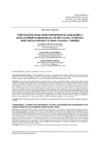Please use this identifier to cite or link to this item:
https://accedacris.ulpgc.es/jspui/handle/10553/114230
| Title: | Etnificación, desahucio por impago de alquileres y desplazamiento residencial en una ciudad turística insular (Las Palmas de Gran Canaria-España) | Other Titles: | Ethnicization, evictions for non-payment of rents and residential displacement in an island tourist city (Las Palmas de Gran Canaria-Spain) | Authors: | Parreño Castellano, Juan Manuel Domínguez Mujica, Josefina Moreno Medina, Claudio |
UNESCO Clasification: | 5401 Geografía económica 6311 Sociología de los asentamientos humanos |
Keywords: | Ethnicization Island Cities Touristification International Housing Market Rental housing, et al |
Issue Date: | 2021 | Project: | Vivienda y movilidad internacional en las ciudades insulares. La aparición de nuevas formas de desigualdad urbana. | Journal: | Estudios Geográficos | Abstract: | Las Palmas de Gran Canaria (Canarias) es una capital insular que, dada su especialización urbano-turística, atrae visitantes, turistas
y migrantes extranjeros. En el cambio de siglo, durante el periodo de expansión económica, se incrementaron los flujos de inmigración laboral y afectaron, especialmente, al espacio central de la ciudad y al entorno de su área litoral de ocio. Sin embargo, a partir de la crisis económica
del año 2008 y posteriores, estos espacios centrales, que habían constituido las áreas preferentes de residencia de la población extranjera, vieron multiplicarse los desahucios por el impago de rentas. Con el proceso de recuperación económica, desde 2014, esta tendencia se ha mantenido. Este trabajo pretende, en primer lugar, analizar la relación espacial que parece existir entre la presencia de población nacida en el extranjero y los procesos de desahucio por impago de alquileres entre 2008 y 2017. En segundo lugar, estudiar el desplazamiento residencial de este colectivo, que se produce en paralelo al incremento de los precios y lanzamientos de las viviendas en alquiler y, por último, indagar en el proceso de sustitución residencial por origen que parece acompañarlo. La combinación de datos que proporcionan las Estadísticas deln Padrón Continuo, sobre población nacida en el extranjero, y el Registro del Servicio Común de Notificaciones y Embargos de Las Palmas de Gran Canaria, sobre desahucios, nos ha permitido realizar un análisis cartográfico y estadístico con estos propósitos. Las Palmas de Gran Canaria (The Canary Islands) is an island city which attracts visitors, tourists, and foreign immigrants due to its urban-tourism specialization. In the turn of the century, during the period of economic expansion, the flows of labour immigrants increased and especially affected the central space and the coastal leisure area of the city. However, since the 2008 economic crisis and onwards, in these central districts that became preferential areas for the residence of foreign population, grew the evictions due to the non-payment of rents. With the process of economic recovery, since 2014, this trend continued. This study aims to analyse, first, the spatial relationship that seems to exist between the presence of population born abroad and eviction processes between 2008 and 2017. Second, study the residential displacement of this group that occurs in parallel to the increase of rents and evictions and, third, investigate the process of residential substitution by origin that seems to accompany it. The data combination provided by the Statistics of the Continuous Register on population born abroad and by the Registry of the Common Service of Notifications and Embargoes on evictions has allowed us to carry out a cartographic and statistical analysis with these purposes. |
ISSN: | 0014-1496 | DOI: | 10.3989/estgeogr.202192.092 | Source: | Estudios Geográficos [ISSN 0014-1496], v. 82 (291), (Julio-Diciembre 2021) |
| Appears in Collections: | Artículos |
SCOPUSTM
Citations
3
checked on Jun 8, 2025
WEB OF SCIENCETM
Citations
4
checked on Jun 8, 2025
Page view(s)
163
checked on Oct 31, 2024
Download(s)
59
checked on Oct 31, 2024
Google ScholarTM
Check
Altmetric
Share
Export metadata
Items in accedaCRIS are protected by copyright, with all rights reserved, unless otherwise indicated.
